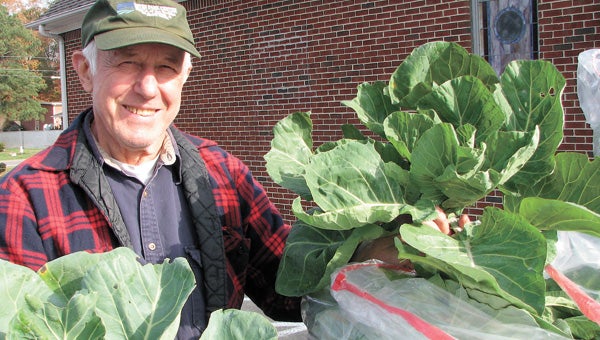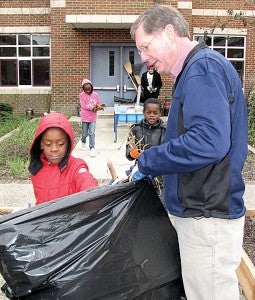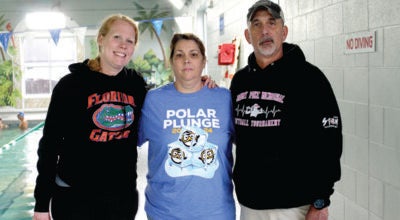A growing trend
Published 5:40 pm Friday, March 22, 2013

Volunteer Ed Kapinus shows off collards grown in a community garden at East Suffolk Recreation Center. They went to a local church to help with its meals program.
Community gardens sprout all over Suffolk
The students in Mrs. Brenda Snashall’s class at Booker T. Washington Elementary School look on with pride at their work.
Right now, it looks pretty much the same as it did before — a raised bed full of dirt. But in a few months, they hope it will be full of the pea plants they just planted.
“Now we need to water them,” one girl says quietly. Suffolk Partnership for a Healthy Community director Robbie Laughton, who hasn’t heard the girl’s suggestion, asks the kids what should happen next.

Suffolk Partnership for a Healthy Community Executive Director Robbie Laughton holds a trash bag for students at Booker T. Washington Elementary School clearing weeds from the learning garden at the school.
“We need four things for our plants to grow,” he says. “We have air, we have sunlight, we have soil; what do we need to do now?”
“Water them!” the class replies in unison.
Mrs. Snashall produces a watering can and sprinkles it over the invisible pea plants. Laughton then says the plants should be visible in five months.
The children are incredulous. “Five months?!”
“Oh, is it not going to take that long?” Laughton teases before telling them they’re right — the plants should be sprouting in about two weeks.
Booker T. Washington hosts one of seven learning gardens located at schools around the city. Students get to tend to the gardens and eat the fruits of their labor at the end of the season, learning about plant biology, healthy eating and a host of other topics in the process.
The partnership also operates six community gardens at other locations, where adults can learn how to grow food and, the partnership hopes, get inspired to start their own gardens at home. The produce from those gardens often goes to church or community projects to feed the hungry or directly to needy families.
In a city that particularly struggles with obesity and related issues, including Type 2 diabetes, such a project is vitally important, Laughton said.
“The outcome is to grow healthy fruits and vegetables so we can grow healthy children and adults in Suffolk,” he said.
The first community garden was planted four years ago, the culmination of several years of planning. The Holland garden at Holland Baptist Church was the first one to till soil and remains one of the most productive, gardens coordinator Kay Cherry said.
“They grow tremendous amounts of vegetables,” she said. “They still have a garden that is big and very labor-intensive.”
The labor at all of the community gardens is provided entirely by volunteers, Cherry said.
“The volunteers are what make this happen,” she said. “What the volunteers have accomplished has been incredible. The community gardens are serving more than just growing food; we are truly growing small little communities of people who are working together.”
At the schools’ learning gardens, one staff member is designated as garden coordinator. Different classes come to it as they move through their Standards-of-Learning-based garden curriculum, developed for the partnership by a graduate student. Depending on the time of the season it is, classes might plant, water, pull weeds or bring in the harvest.
“They get the concept of good food and how over a lifespan it can make a difference in how we live,” Cherry said of the kids.
The gardens are funded by the Obici Healthcare Foundation, the Virginia Foundation for Healthy Youth, the Community Action Coalition of Virginia and the Clean Community Commission. In addition, several organizations such as Ruritan clubs helped get the projects off the ground, and groups like the Virginia Cooperative Extension, the Master Gardeners and the YMCA have partnered to help with the gardens.
“We’re using the healthy food to help expose people to new skills and how to grow food themselves,” Cherry said. “The thing we recognize is, food is more than just sustenance.”






